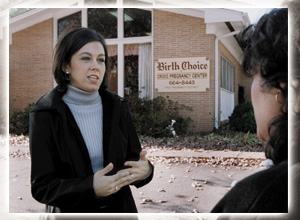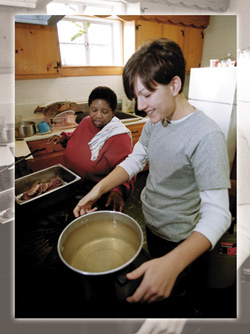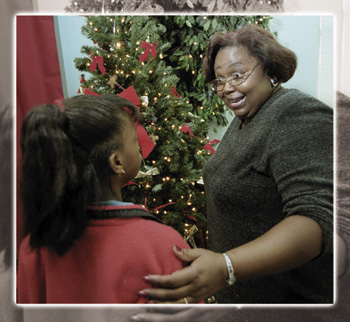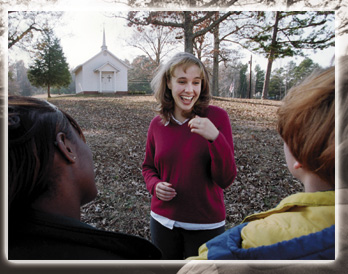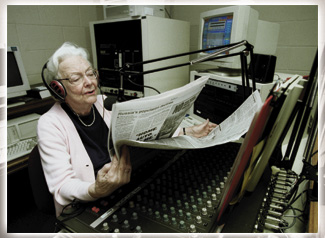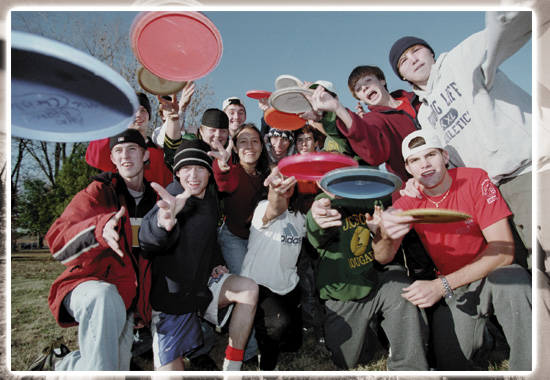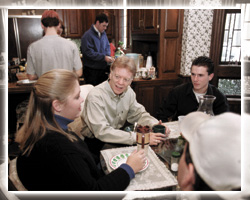|
What compels us to make a difference in the lives of others? Union faculty, staff and students strive to transform the world around them by Sara Horn |
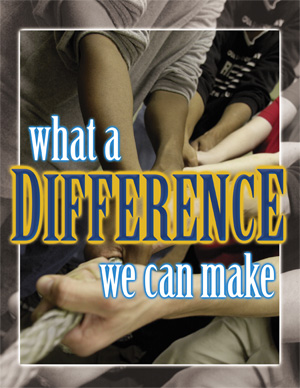
|
||||||||||||||||||
|
“I asked the director what she meant, and she said that there were no infants left to adopt,” remembers Lambert. “That’s when it started making sense – I mean, look at all of the couples who now travel overseas to adopt children.” Soon after that, a close friend had a little boy with Down’s Syndrome, with multiple health problems as a result. “Seeing doctors and nurses cry over this very defective baby – the Lord really hit it home for me that the only difference between this child and other children who’ve been aborted is – this child is wanted,” states Lambert. Lambert says it was those two experiences that began his desire to make a difference in the fight against abortion. Now the director of Birth Choice, a women’s resource center in Jackson, Tenn., Lambert along with more than 40 volunteers, make themselves avail-able for counseling to more than 700 women who pass through their doors each year with crisis pregnancies.
Several Union faculty, staff, their spouses and students serve actively in various volunteer positions for the clinic, including Union President David S. Dockery, who is a member of their board of advisors. “This is a very significant organization and a real shining light in a culture of darkness,” says Dockery. “I admire their courage, I appreciate their compassion, and I think it’s making a significant difference in the lives of young women, many of whom are saved as the result of this work.” Sandra Hathcox, an adjunct professor in the department of education, serves on Birth Choice’s board of directors. “This is one way I know I can make a difference,” says Hathcox. “The people who are involved are people that I love and care about, they’re important to me personally, but also, they’re very important to the saving of human life.” Keri Baumgardner, a junior psychology major, recently began her training as a volunteer counselor for the clinic. “My mother had given a child up for adoption when she was younger, and she has always encouraged me to step out and let God use me,” says Baumgardner, who wants to work with children and adolescents after she graduates. “Life is not about doing easy things.” She points out that adoption is not usually the option that’s considered; rather it’s the rare choice. “I want to let the girls I counsel know that no matter what the situation, God’s still going to be there even when they feel like no one else is,” says Baumgardner. “We want to let them know that God’s love is unconditional – no strings attached.”
Encountering difference Faith, Bush says, is one place where the aspect of difference can be visible. Faith is willing to take the risk by embracing difference. This, as Bush points out, is what helps us grow. “When you go through an experience of encountering different ideas and moving outside of your personal box – encountering things that are strange and risky – this is what helps to develop us,” explains Bush. He says that when differences are experienced, individual character is developed and we grow as people. “When we are then later called upon to make a difference, then we really can.” Bush believes that the person who doesn’t risk anything is not going to make a real difference. “A person has to struggle and exert himself completely, like Abraham did, and follow the call of God. As absurd as that may seem to leave one’s homeland, this is the only way we can be prepared to make a difference in the world,” says Bush.
Stepping out of the box Working with others in helping to get the word out and asking for donations, Sipes said that the church’s first meal served more than 70 people, mostly children. “As I study scripture, I see God’s heart for the poor,” says Sipes. “I really feel like that’s what my life’s supposed to be about – and by ministering to these people, I’m serving Jesus.” Sipes also says that the community meal, which is now offered every other week, has helped the church to be more outwardly focused. “People are becoming more attuned to what’s happening outside of their own personal boxes.” Accepting the differences you may find “You have to separate a person from his or her behavior,” says Wilson. “And for some people, that is a very hard thing to do. But if you want to make a difference and work effectively with people, you have to recognize that though you may not agree with this person’s choice of lifestyle, they are still created by God and another human being. And you can make a difference.”
Wilson, herself, is making a difference in the lives of 18 young African-American men. A member of the national sorority, Phi Delta Kappa, Inc., Wilson was asked to begin a KUDO organization, a club which is made up of African-American high school males. “Since I had a son myself, it made it fairly easy for me to say yes to organizing the group since I was relating to that age group anyway,” explains Wilson. Starting with a group of nine high school boys, the club is now in its second year, and has doubled in size. Wilson says the mission of the group is two-fold: Exposing them to different cultural and social events as well as giving them the opportunity to serve others through community service projects. Some of the projects the boys have done include “Breakfast with Santa,” a joint effort done with the Student Association of Social Workers at Union that is targeted toward children under 10, a canned goods drive for a program that serves the mentally ill, and visiting an assisted living facility. “So many young people are falling through the cracks,” says Wilson. “I think it’s important to provide some positive things they can belong to and be part of.”
Making a difference early on Active in Union’s Campus Ministries, Young’s responsibilities go further: she currently is the coordinator for other Union students who are mentors at Youth Town. “Last year Jay Ridenhour (the director of discipleship ministries at Union) and I were talking about what I could do as a ministry, and he had mentioned Youth Town. We started brainstorming about how we could connect with the students there. These kids could care less if you have a degree in Christian studies,” says Young, pointedly.
Eventually, three different programs were created. Mentoring opportunities, a Thursday night Bible study and a monthly worship service called “The Bridge,” all led by Union students. Young believes she and other Union students make a big difference in the lives of the young people at Youth Town. “I think we have to go back to the consistency thing. These students had adults in their lives, but for the most part, those adults either didn’t care, or they cared for the wrong reasons. For the Youth Town kids to have young adults come in and consistently want to form relationships, I think that makes a huge impact. And we’re planting seeds as we share the gospel and are teaching them Biblical truths,” says Young . “My first two years at Union, I basically stayed here on campus and did campus-related ministry,” adds Young . “But I think that as God fills, there’s got to be an overflow somewhere. That over-f low for me has been Youth Town. It’s an organization that I believe in because it’s reaching kids where they are – even though there’s government supervision, the counselors there aren’t afraid to use Christ as the basis of their programs.” “One of the biggest things that I’ve learned while being at Union has been my view of God,” explains Young. “He tells me how to act, He tells me how to live before my little sister and the students out there, and He’s the one who’s going to change lives. My job is just to pray and be there for them.”
So what difference does it make? “From a worldly perspective, many people perceive altruism, doing things for other people, as building a type of bank with lots of deposits where you can make a withdrawal later,” explains Larsen. Norms in society dictate that if someone is hurt, one should help that person.
Larsen also adds that helping some-one else can generally be perceived as a reward because it makes the person helping feel good about themselves. “It’s part of human nature that we want to feel good about ourselves,” says Larsen. “From a Christian perspective, we do good things for people because of what God has done for us, and we want to pass that on.” Socio-biologically, however, we are more likely to help those who are more like ourselves than different. Larsen says this is an unfortunate act of human nature. “A lot of factors play into this, but there’s a subconscious idea there that if someone is like you, and you help them, somehow that is in turn coming back to help yourself,” says Larsen. She adds that your emotional state at the time and your perceptions of that per-son influence your decision on whether you help them, or how much help you give. “Our perceptions, as Christians though, should also be influenced by our relationship with Christ,” says Larsen. “We shouldn’t assume the worst about someone, but, rather, leave the judging up to God.” “I’m just here to love them” Hatley – along with four other Union students, Ben Bredow, Ben Dockery, Dow Davidson, and Ray Pettigrew – works with the local chapter of the national organization of Young Life, a non-denominational relational ministry devoted to sharing the gospel with high school students through one-on-one relationships. Each of them leads a group at five of the high schools in Jackson. “A lot of the kids that come to Young Life are kids who won’t come to church,” says Dockery, a sophomore who has been involved with the organization for a little more than a year.
The format of the program works like this: each specific high school holds a Club Night, one night a week where all students from that particular high school are invited to come and attend. They sing songs, play games and then someone speaks and shares a testimony. “Club is a tool to meet kids where they are,” explains Pettigrew. “It’s a place where they can hang out with their friends, but at the same time, they’re being exposed to the Gospel.” There are also Campaigner groups – small group Bible studies, where the Young Life leaders can develop one-on-one relationships with the students. Dow Davidson, who graduated from Union in May of 2000, is employed part-time as a Young Life staff member. As a high school student, he began attending the Club meetings as “a way to meet girls and take trips.” Hi s senior year of high school, however, he accepted Christ on one of those trips, and his entire life changed. Now he tries to give back what he’s received. “The guys in my Bible study – some of them have broken my heart,” admits Davidson. “They’ve done things and continue to do things even though we’ve talked about what they’re doing. Other guys have responded to Christ – in either case, they know that I love them regardless.”
Where you are and beyond “We both believe in mentoring,” says Glidewell. “I never felt I wanted to be anywhere else but with youth. Young people are the key to what God’s doing in this generation.”
Since coming to Union in 1997, the Glidewells have continued to seek to provide a place of refuge for students. A year ago, they began holding a Bible study in their home. “We just wanted to see students all over town be motivated for Christ and to seek out and find out how they can plug in to what God’s doing,” explains Glidewell. Interest in the Bible study grew quickly, and recently was moved to a local Christian-owned bagel and coffee shop, in order to provide more access, not just for Union students, but for students from other nearby universities. Glidewell also has a desire to involve young people in global missions. Since December of 1994, he has taken several thousands of students overseas for mission opportunities. “One-third of the world’s population is youth. Who better to reach youth than other youth?” says Roger. He adds that it’s important to make students aware that youth ministry doesn’t have to be limited to the United States – so far, Union students and local youth groups have visited countries such as Russia, Jordan, Israel, Ukraine, Romania, Guatemala, and Brazil. “American teens are magnets,” says Roger. “Most mission trips are directed to adults or children. Our niche is to wed teens who can do something now with teens who have nothing.” Taking a leap of faith “It’s not so much what we think about the world, but how we make a difference in the world,” says Bush. The difference that we make and experience all along the journey of life, Bush adds, is also a difference from one level of understanding to another. Reflected in terms of what we end up doing in our world, Bush says, is whether what we do makes a profound difference rather inconsequential. “We want to make waves, we don’t want to make ripples,” says Bush. “Christians, in order to make more of a wave, need to remove themselves from their little personal bubble of ‘Jesus and me,’” says Bush, and ask what implications are there for the redemption that is in Jesus Christ in all levels of existence – ranging from physical, social, and cultural aspects. “We need to rediscover the Christ who is Lord of all – not just Lord of the soul, but Lord of all. Then we can truly make a difference.” |
|||||||||||||||||||
